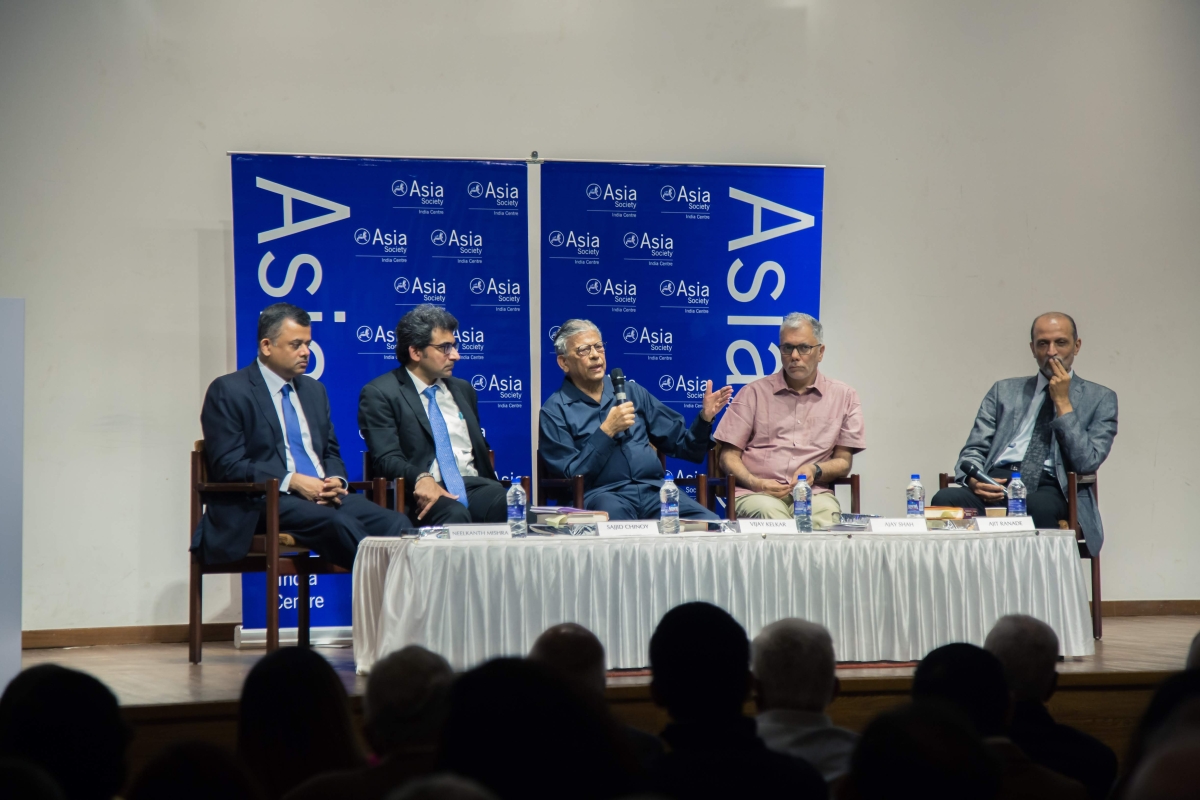In Service of the Republic

(L-R): Neelkanth Mishra, Sajjid Chinoy, Vijay Kelkar, Ajay Shah, Ajit Ranade.
MUMBAI: On December 17th, Asia Society India Centre hosted Dr. Vijay Kelkar, former Finance Secretary and Chairman of the Thirteenth Finance Commission, Ajay Shah, Professor, National Institute of Public Finance and Policy, Subramaniam Ramadorai, Chairman of the Advisory Board at TATA Strive and former CEO, MD and Vice-Chairman of Tata Consultancy Services, Sajjid Chinoy, Chief Economist at J.P. Morgan India and Neelkanth Mishra, Managing Director, India Strategist and co-head of Asia Pacific Strategy for Credit Suisse. The discussion was moderated by Ajit Ranade, Group Executive President and Chief Economist with the Aditya Birla Group, and included topics such as economy, disinvestment, market failure, and public policy.
Mr. Ramadorai delivered the opening address and spoke about several topics like Government initiatives to elevate India to a $5 trillion economy, digitization as a means towards an equitable society, promotion of women in the workplace and climate change. This was followed by the panel discussion.
The conversation commenced with the authors sharing the inspiration and purpose of the book, with Dr. Kelkar speaking about the need for a third wave of reforms after Pt. Nehru and Dr. Manmohan Singh's first and second wave.
The book discusses at length the subject of market failure and what constitutes it, and the panelists addressed the crises of UTI and IL&FS in this respect. They discussed whether a similar resolution mechanism like the Troubled Asset Relief Program (TARP) of the USA should be implemented in India to solve the IL&FS crisis.
Ranade then steered the conversation towards the economy and questioned the panelists on what solutions are available to rectify the problem. To this, Mishra responded by saying that lowering interest rates should be the first step of resolution and then inflation needs to be stabilized.
The panelists were then asked a series of rapid-fire questions, most pertinent of which was their support for Universal Basic Income (UBI). Both Chinoy and Mishra said that for UBI to be possible and sustainable, it needs to be accompanied by a withdrawal of subsidies and a good fiscal space.
Ranade then quizzed Shah on the difficulties associated with involving voters in the public policy process, to which he replied that the inclusion of voters in the complications of public policy is a romanticized idea. In India, voters cast their votes based on shared values and not on the robustness of the candidate's policy structure. We must work on building our republic through the tried and tested method of representative democracy, rather than attempting to deepen democracy through other means.
The panelists then engaged in a QnA session with the audience, who asked questions on the revenue neutrality of GST, the difference between market and Government failure, privatization of public sectors and behavioral economics.
As reported by Aatreya Bhat, Programme Intern, Business and Policy, Asia Society India Centre.
Watch the full programme here: https://www.youtube.com/watch?v=6hRIPMVmGmI&feature=youtu.be
